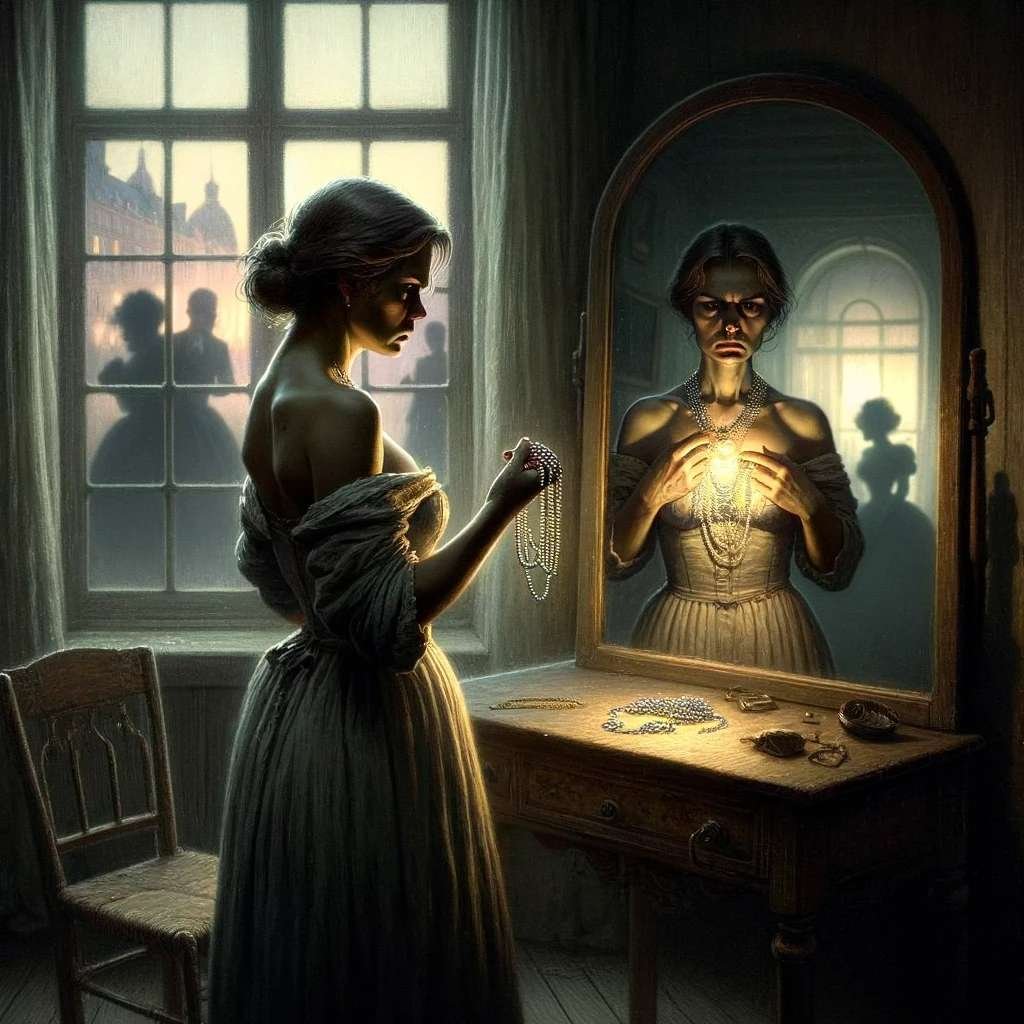A woman’s vanity leads to ruin after losing a borrowed necklace, only to discover its shocking, life-altering secret too late.
This story is an adaptation of The Necklace by Guy de Maupassant.
Enjoy Reading
Maddie was that stunning, effortlessly charming girl who, by some twist of fate, found herself born into a middle-class family.
Lacking a dowry, connections, or any real hope of catching the eye of someone wealthy and powerful, she ended up marrying a guy who worked a desk job at the Department of Education.
Her style was simple, dictated more by necessity than choice, yet she carried herself with an air of someone meant for finer things.
In her world, it wasn’t about your last name or your bank account; it was beauty, poise, and the ability to captivate a room that set you apart, often elevating ordinary women to stand among the most esteemed.
Maddie lived in a constant state of longing, feeling deep down that she was destined for a life filled with the finer things.
The modesty of her apartment, with its plain walls, outdated furniture, and drab curtains, was a daily torment. To her, these were not mere inconveniences but reminders of what her life could have been.
The sight of her cleaner, a young woman from the countryside, only deepened her yearning for luxury, stirring up fantasies of grand halls, elegant soirees, and the company of the elite.
Sitting down to yet another basic meal across from her husband, who seemed genuinely excited about something as mundane as soup, Maddie couldn’t help but dream of lavish dinners, exquisite silverware, and being surrounded by opulence and admiration.
She craved the glamour, the attention, and the envy of others, feeling trapped in a life far removed from her desires.
Maddie had a wealthy friend from her school days whom she now avoided, as the visits only served to deepen her dissatisfaction with her own circumstances.
Then, one day, her husband came home, beaming, waving an envelope in the air, proclaiming, “Got something for you.”
Eagerly, she opened it, only to find an invitation to an exclusive event at the Ministry of Public Instruction.
But instead of excitement, she felt frustration, tossing the invite aside and bitterly wondering, “What am I supposed to do with this?”
Alex, taken aback, tried to reason with her, “I thought you’d be excited. It’s a rare chance to get out, and mingle with the big shots.
It wasn’t easy to get; this event is exclusive, and they’re hardly inviting any clerks. Everyone who’s anyone will be there.”
Maddie shot him a look of pure irritation and snapped, “And what exactly am I supposed to wear?”
Alex hadn’t considered that. He stumbled over his words, “What about your theater dress? It looks great to me.”
But seeing Maddie’s tears, he realized the depth of her distress. “What’s wrong? Talk to me,” he urged.
With a monumental effort, Maddie calmed herself and said, wiping away tears, “It’s nothing. It’s just… I don’t have a dress for the ball. Maybe give your invite to someone else, someone who can afford to dress the part.”
Alex felt a wave of despair but quickly tried to find a solution, “Let’s think this through. How much would a decent dress cost? Something you could wear again, nothing too fancy?”
Maddie hesitated, doing mental math and wondering how much she could ask for without causing a panic. “I’m not sure, but maybe four hundred francs could cover it?”
Hearing the amount made Alex pale; he had been saving exactly that amount for a hunting trip. Nonetheless, he committed, “Okay, four hundred it is. Just make sure it’s a dress you love.”
As the event approached, Maddie grew increasingly anxious, even with the new dress. “What’s bothering you?” Alex asked one night, noticing her mood.
“I don’t have any jewelry to wear. I’ll look out of place,” she lamented.
“Why not wear flowers? They’re in fashion these days,” Alex suggested, trying to be helpful.
Maddie dismissed the idea, “That just screams ‘poor.’ I’d rather not go.”
Exasperated, Alex suggested, “Why don’t you borrow something from your friend, Madame Forestier? You’re close enough to ask.”
A spark of hope lit in Maddie, “That’s brilliant! Why didn’t I think of that?”
The next day, she visited her friend, sharing her woes. Madame Forestier opened her jewelry box, offering Maddie her choice.
Maddie’s eyes danced over bracelets, a pearl necklace, and finally landed on a diamond necklace that took her breath away. Clasping it around her neck, she was mesmerized by her reflection.
“Can I borrow just this one?” she asked, a mix of excitement and nervousness in her voice.
“Of course, dear,” Madame Forestier replied, unaware of the whirlwind of emotions she had just unleashed.
Maddie hugged her friend tightly, then hurried home with her borrowed treasure, her heart racing with anticipation and dread.
The night of the gala, Maddie was the star. She outshone every other guest with her elegance, grace, and radiant joy.
Men from all corners of the room sought her out, wanting to know her, to dance with her. Even the minister took notice.
She danced with abandon, utterly lost in the joy of the moment, basking in the adulation and the sense of victory such attention brought.
It was a euphoria, a cloud of pure happiness made of compliments, longing looks, and the thrill of being the evening’s standout.
The party wound down at the break of dawn. Alex had been asleep for hours in a side room, alongside other husbands detached from the festivities.
Throwing a simple wrap over Maddie’s shoulders—a stark contrast to her glamorous gown—highlighted the night’s transformation from fantasy back to their modest reality. She cringed, not wanting the other, fur-clad women to see her now.
“Wait, let’s find a cab. You’ll freeze,” Alex insisted, but Maddie, in her haste to leave, barely heard him.
They ended up on a chilly street, struggling to hail a cab until they found one of the old night cabs, hidden by day, now their only ride home.
Back in their apartment, the magic of the night seemed a distant memory. It was then, in front of the mirror, trying to capture one last glimpse of her evening’s glamour, that Maddie’s heart sank.
The necklace was gone.
“What’s going on?” Alex, half undressed, saw the panic in her eyes.
“I’ve lost it. The necklace… Madame Forestier’s necklace is gone,” she stammered, disbelief and fear mingling in her voice.
“How could that be?” Alex was dumbfounded. They searched every inch of her dress, coat, pockets—no luck.
“Are you sure you had it when we left?” he pressed.
“Yes, absolutely. It must’ve been in the cab,” she reasoned, hopelessness in her tone.
“Did we get the cab number?”
Neither had thought to. Desperate, Alex decided to retrace their steps, hoping against hope to find it.
Maddie, drained and defeated, couldn’t muster the strength to move, sitting in her ball gown, lost in a haze of despair.
Alex returned as the morning light crept in, empty-handed and exhausted.
Alex scoured the city, from the police station to newspaper offices, offering a reward, even visiting all the cab companies, clinging to a sliver of hope.
Maddie spent the day gripped by a paralyzing fear, dreading the fallout from this disaster.
When Alex returned that night, his face gaunt, his spirit crushed, he had nothing to show for his efforts.
“We’ll say the clasp broke and it’s being fixed,” he suggested, a desperate plan to buy them time.
Following his lead, Maddie penned a note to her friend, feigning calm.
A week later, hope had evaporated. Alex, looking years older, resigned himself to the inevitable: “We need to replace it.”
They visited the jeweler listed on the box, who denied selling them the necklace but had provided the case.
Their quest led them to numerous shops, each visit was a mix of hope and despair.
Finally, at the Palais Royal, they found a duplicate necklace, priced at a staggering forty thousand francs, negotiable down to thirty-six.
They pleaded for a hold, securing a deal to buy it back for thirty-four thousand if the original turned up by February’s end.
Alex had eighteen thousand francs to his name; the rest he borrowed through a series of debilitating loans, signing his life away to a future of uncertainty and hardship.
When they returned the necklace, Madame Forestier’s cold response belied the turmoil they’d endured: “You should have returned this sooner.”
She never checked the box, never suspected the switch. But the cost was monumental for Maddie and Alex.
Their lives transformed overnight. They fired their maid, moved into a cramped attic, and Maddie learned the harsh realities of domestic drudgery.
Her once delicate hands now scrubbed pots and carried heavy loads, her beauty hidden beneath the wear of manual labor.
Every month was a battle with debt, Alex taking on extra work, his nights consumed by ledgers and manuscripts for meager pay.
This new existence stretched on for ten long years until every debt was paid, at the cost of their youth and happiness.
Maddie, now aged beyond her years, bore the physical marks of their struggle. Yet, in quiet moments, her mind wandered back to the night of the ball, to a time when she was the belle of the ball, unaware of the cruel twist of fate that lay ahead.
What if she had never lost that necklace? It’s a question that haunts us, a reminder of how life’s tiniest twists can have monumental consequences.
One Sunday, seeking solace from her toils, Maddie found herself strolling through the Champs Elysees. There, she spotted Madame Forestier, as radiant as ever, with a child by her side.
Compelled to reconnect and perhaps find closure, Maddie approached her.
“Greetings, Jeanne.”
Madame Forestier, taken aback by this unrecognizable woman, hesitated, “I… I’m sorry, do I know you?”
“It’s me, Mathilde Loisel.”
Recognition sparked shock. “Oh, Maddie! You’ve changed so much!”
“Yes, it’s been a tough few years, marked by hardship… all because of that night.”
“Because of me? But how?”
“Do you remember lending me a diamond necklace for that ball?”
“Of course, but you returned it.”
“That’s just it. I lost your necklace. The one I returned was a replacement. It took us ten years to pay off.”
Madame Forestier froze, the gravity of the situation dawning on her. “You mean to say you replaced my necklace with real diamonds?”
“Yes, and we never noticed the difference, did we?” Maddie managed a bittersweet smile.
The revelation hit Madame Forestier hard. Taking Maddie’s hands in hers, she shared the devastating truth,
“My dear Maddie, my necklace was an imitation, worth no more than five hundred francs.”
The End
Reflections
What would you have done in this situation? Please let me know in the comments.
If Maddie had told her friend about everything from the beginning, wouldn’t their lives have been different?
What are your thoughts?
Also Read: An Angel in Disguise or A Story of Regret


First of all I would have looked at the borrowed object very well or at least ask if it’s real. But now, if I had lost a necklace which I think was that expensive, I would have done something similar of them. I’m being honest, if I lost a very expensive borrowed object, I’d probably panic like them.
I think if Maddie had told her friend the truth from the beginning they would surely have had a better life.
I loved the story. Thank you and sorry for giving you too much to read.
Hi Leonardo,
Thank you for sharing your thoughts and reflections on the story! I agree that honesty can often lead to better outcomes.
I’m glad you enjoyed the story and found it engaging. Your feedback is always welcome, so no need to apologize.
Have a wonderful day!